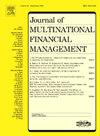大宗商品波动性指数与七国集团(g7)股市回报率之间的连通性在各个回报率分位数之间是否相同?
IF 4
3区 经济学
Q2 BUSINESS, FINANCE
Journal of Multinational Financial Management
Pub Date : 2025-08-07
DOI:10.1016/j.mulfin.2025.100921
引用次数: 0
摘要
本研究考察了2017年1月1日至2022年6月16日七国集团股票市场、石油和黄金波动之间的连通性和溢出效应。通过采用分位数溢出方法,本研究通过对这些市场之间的联系进行全面分析,为现有文献做出了贡献。研究结果表明,溢出效应是高度动态的,并且在回报分布的不同分位数之间存在显著差异。在2019冠状病毒病大流行、贸易紧张局势和地缘政治冲突等市场动荡时期,溢出强度增加,表明市场相互依赖性增强。日本股市和黄金波动指数(GVX)一直是冲击的净接受者,而加拿大、法国、德国、意大利、英国和美国的股市则是冲击的净发送者。尽管长期分散投资的机会似乎有限,但黄金和石油在各种市场条件下对短期投资者都表现出有效的对冲特性。从政策角度来看,这些发现强调了监测市场相互依赖性的重要性,特别是在危机时期。政策制定者应实施协调一致的战略,以减轻金融市场的系统性风险,特别是在不确定性加剧的时期。投资者应考虑使用黄金和石油的短期对冲策略,以在市场低迷时期将风险敞口降至最低。此外,七国集团国家的金融监管机构应加强监督机制,以预防可能威胁金融稳定的过度溢出效应。本文章由计算机程序翻译,如有差异,请以英文原文为准。
Is connectedness between commodity volatility indices and G-7 stock market returns the same across return quantiles?
This study examines the connectedness and spillover effects among G7 stock markets, oil and gold volatilities from January 1, 2017, to June 16, 2022. By employing an in-quantile spillover approach, the study contributes to the existing literature by providing a comprehensive analysis of the linkages between these markets. The findings reveal that spillover effects are highly dynamic and vary significantly across different quantiles of the return distribution. During periods of market turbulence—such as the Covid-19 pandemic, trade tensions, and geopolitical conflicts—spillover intensity increases, indicating heightened market interdependence. The Japanese stock market and Gold volatility index (GVX) consistently act as net recipients of shocks, whereas the stock markets of Canada, France, Germany, Italy, the UK, and the USA serve as net transmitters. While long-term diversification opportunities appear limited, gold and oil exhibit effective hedging properties for short-term investors across various market conditions. From a policy perspective, these findings underscore the importance of monitoring market interdependencies, particularly during crisis periods. Policymakers should implement coordinated strategies to mitigate systemic risks in financial markets, especially in times of heightened uncertainty. Investors should consider short-term hedging strategies using gold and oil to minimize risk exposure during market downturns. Furthermore, financial regulators in G7 countries should enhance surveillance mechanisms to preempt excessive spillovers that may threaten financial stability.
求助全文
通过发布文献求助,成功后即可免费获取论文全文。
去求助
来源期刊

Journal of Multinational Financial Management
BUSINESS, FINANCE-
CiteScore
7.30
自引率
4.80%
发文量
25
审稿时长
30 days
期刊介绍:
International trade, financing and investments have grown at an extremely rapid pace in recent years, and the operations of corporations have become increasingly multinationalized. Corporate executives buying and selling goods and services, and making financing and investment decisions across national boundaries, have developed policies and procedures for managing cash flows denominated in foreign currencies. These policies and procedures, and the related managerial actions of executives, change as new relevant information becomes available. The purpose of the Journal of Multinational Financial Management is to publish rigorous, original articles dealing with the management of the multinational enterprise. Theoretical, conceptual, and empirical papers providing meaningful insights into the subject areas will be considered. The following topic areas, although not exhaustive, are representative of the coverage in this Journal. • Foreign exchange risk management • International capital budgeting • Forecasting exchange rates • Foreign direct investment • Hedging strategies • Cost of capital • Managing transaction exposure • Political risk assessment • International working capital management • International financial planning • International tax management • International diversification • Transfer pricing strategies • International liability management • International mergers.
 求助内容:
求助内容: 应助结果提醒方式:
应助结果提醒方式:


